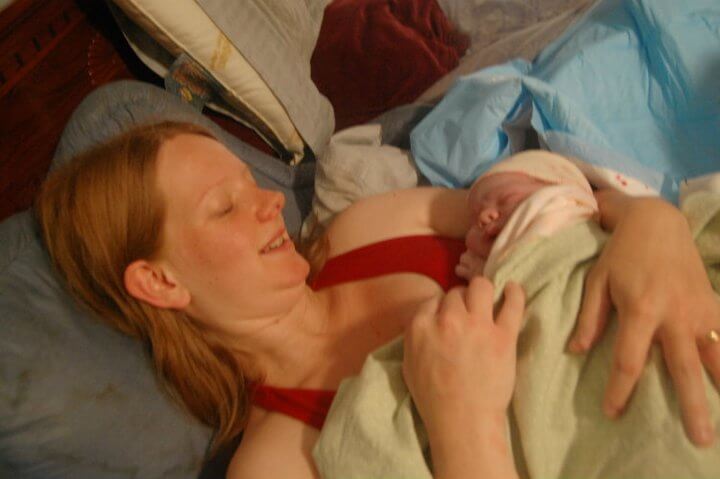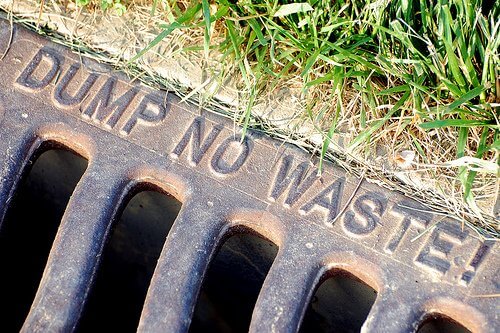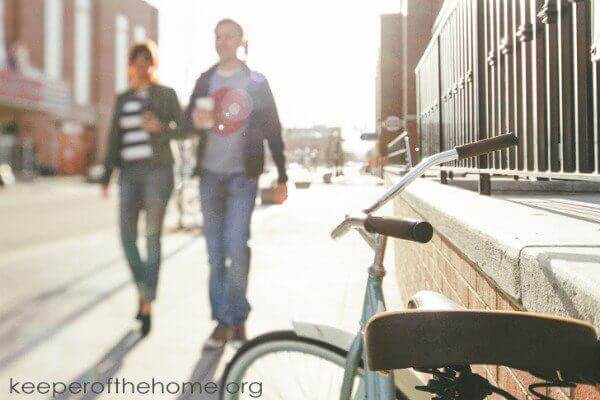Natural Ways to Recover from Pregnancy

Written by Kate Tietje, Contributing Writer
Post-pregnancy, there’s a lot going on. You have a brand-new baby to get to know, learn to breastfeed, and care for. You still have your home and possibly other children that need care. And of course, there’s the physical recovery from pregnancy. I always thought it seemed a little unfair that I was expected to be fully responsible for a tiny person when I was physically drained from pregnancy, labor, and birth! (Although after three babies, the real drain is keeping up with “everything else,” not the new baby!)
It’s so important to take care of yourself as much as possible in the early days and weeks, though, so that you don’t suffer a physical or mental illness postpartum. You won’t be any good for anyone else if you’re worn out and dragged down.
Go slow and pamper yourself. Beg for help from anyone who will come and stay. (My husband stayed for two weeks after each of my babies, and my mom stayed for an additional two weeks. My in-laws also stayed for about five days after my third baby was born, largely to care for my older children.)
There are things you can do to help recover from pregnancy, though, that are natural, safe, and frugal. If possible, have these things on hand prior to labor so no one’s scrambling when you’re home with a new baby!
Natural Aids in Recovery
Soothing Herbal Bath — If you’re at home when your baby is born, plan to take an herbal bath within an hour or so of giving birth. If you are not, take one as soon as you get home. Have someone else draw a very warm bath for you and slip this in. It will help to heal your sore tissues.
Comfrey Ice Packs — Cut a large piece of soft cloth (flannel is fine, but bamboo velour is awesome) and fold it up into a smaller rectangle that’s about 3×5. Sew it on all four sides (straight stitch and no big deal if you mess up). Prepare a strong tea with about 2 cups water and 1/2 c. comfrey leaves, steeped for 15 min. Soak each cloth in the tea and put each in an individual plastic bag and stick this in the freezer. (I recommend putting all the small plastic bags into one large one so they’re easy to find.) This is a nice ice pack that will help soreness post-birth. You can also use the soothing herbal mix from above instead of plain comfrey.
Arnica pellets — The afterpains can be killer for a few days, and they’re worse with each baby. Keep some arnica pellets on hand and take them every 3 – 4 hours for the first few days to take the edge off.
Massage oil — Sometimes, weird things happen in birth. Maybe the baby was positioned oddly, or posterior. You may have sore muscles. (My second baby was ROA, which means his back was against my right side, and somehow with the position he was in and the way I pushed, my muscles in my left hip hurt so badly for weeks. That was the worst part of recovery.) This massage oil will help soothe those sore muscles and reduce any pain you have.
Coconut water — You may become dehydrated if you were in labor a long time and forgot to drink much, or if you were nauseous and didn’t want to drink. Coconut water can replace electrolytes in your body. If you don’t really like it (I wasn’t a huge fan), mix it with some tea or juice, a flavor you prefer. Herbal tea is a great option too, by itself or mixed with coconut water.
Nourishing meals — Eat a very nutrient-dense diet, filled with eggs, grass-fed butter, milk and beef, bone broths, real sourdough bread, and more. Eat constantly, as much as you want. Do not worry a bit about weight loss; that will come. Low-calorie and low-fat diets are not the way to accomplish that anyway.
Chamomile, Catnip, or Skullcap — If you are struggling to get rest in the early weeks (and not because your baby is waking you — some women experience hormonal fluctuations that lead to insomnia), try one of the herbs listed in tea form. They’re very, very mild sedatives that can help you relax enough to sleep. Insomnia can also be due to magnesium deficiency, in which case you might want to look into a transdermal magnesium oil spray.
Placenta Pills — Did I just freak out any of you? Some midwives or doulas will encapsulate your placenta for you. They’ll rinse it, dehydrate it, powder it, and put it in capsules. These tend to really smooth out hormones and help prevent postpartum depression, especially for women who are prone to it. Some women think that eating the placenta raw (possibly by mixing it into a smoothie) is an even better idea, but I don’t think I (or many of you) could handle that. Capsules are just fine. Bonus? If you don’t need them all, you can save them until menopause and they can ease your symptoms then, too!
Stephanie’s note: Placenta encapsulation is a bit more controversial, with lots of different views surrounding it, particularly for Christians. Personally, I’m not sure what I think about it yet, though I’ve heard many benefits, and also some very valid arguments against it. I’d prefer for this post to not become a debate on the use of the placenta, but it’s just something to consider. 🙂
Within several weeks (don’t push it!), you’ll bounce back and feel much more like your normal self. Taking extra time to rest and relax and letting others help you while you’re recovering is a great way to ensure that you remain healthy through this huge physical time in your life.





Eat lots of healthy fiber, like whole grains and lots of fruit. I ate so much fruit since my daughter was born in June so peaches and cherries were daily parts of my diet. Fiber helps your poor traumatized intestinal system recover more quickly and get things back to normal. I also recommend witch hazel pads. If you have any tearing or stitches it definitely helps make the edge off. If you can breast feed, do, it actually helps the recovery process including dealing with the changing hormonal levels, and the return of the uterus to normal size. (Plus, it does burn calories, for those of us insecure about losing the baby weight. So you don’t have to feel guilty about not exercising for a while. Breastfeeding is exercise. Healthy diet and hydration also helps keep you healthy during breastfeeding as well.)
I’m so not looking forward to the afterpains with future children! I thought it hurt with #1! Yikes.
Congratulations on the birth of your sweet baby boy! This is an incredibly wonderful, trying, tiring time. May you get all the rest, comfort, and “tending to” that you can. I birthed all three of my babies at home, and what a wonderful experience they all were!
I would also like to add the possibility of a placenta tincture. It has a long shelf life when stored right and gives you much more product with a smaller bit of placenta. I had both encapsulated placenta and tinctured placenta and I felt I got greater benefit from the tincture. (Some people have fabulous results with the capsules, but I personally didn’t notice a huge difference.) Contoversial? Yes. Do I recommend it? Yes. I had such bad PPD after my first child (no caps or tincture) and just very mild/normal blues after my second (caps used right away with tincture used here-and-there once caps were gone).
Healing up afterward is rough. If you have a husband willing to help, as mine did, you might want to ask for help in simple things.- i.e Getting out of bed was painful for midnight feedings (even though my tearing was not too bad). My husband would change the baby and bring her to me to nurse in bed for ALL midnight feedings for the first couple weeks. It was amazing. He has continued to do this for our other children as well!
Learning to accept help is hard for many women (including myself) because the Lord created us to be nurturers. We like to serve but sometimes have a hard time being served. Allow others to help discretionally as you heal and your family is transitioning the new blessing into your home. I enjoyed the meals my friends brought, the helpful visits of those wanting to help, and even the times that it was just my family and no help (as that helped us to come together and bond with the baby). Discretion is important. Know your family well enough to know when you need the help and when to turn it down.
This all sounds like wonderful advice. I am due with my first in July! I am so nervous about friends coming over and wanting to help though because I think I will feel like I have to entertain them(and that stresses me out). Did anyone experience this with the birt h of their kids?
I had very few people visit me for the first week after each kid was born. But The ones who did brought my family dinner, said “Hi” and left. If you don’t want people hanging around then just let them know you need to get used to the new member of your family or you are sore or whatever… your friends should respect your wishes.
To be honest though, all you are going to want to do is sleep when you can so whatever your situation just listen to your body. It is much less scary when you are in the moment!
I explain the concept of a baby moon ( like a honeymoon – a time for getting to intimately know the other person, bond and enjoy your new relationship. People would never dream of taking all their family and friends along on a honeymoon so why should a baby moon be any different.
I also suggest to my patients that they put a sign on the front door with something like this: we are so glad you have come to celebrate and support us. The best way to care for us right now is to… Then put a list of whatever needs to be done like load or unload the dishwasher, fold a load of laundry, vacuum, dust, etc. That way, people’s expectations are adjusted before they ever enter your home.
If it makes you feel weird to ask people to help, then consider setting either quiet hours or visiting hours and ask your husband, doula or mother to play the protective enforcer. Post the hours on your Facebook, blog or send out a mass email.
As a final commentary, my mom reminds me that others are blessed when I allow them to help me. She jokes that by refusing to allow myself assistance I’m essentially robbing someone else of their blessing. When I think about it this way, it makes it much easier to allow someone to show their love and care through a chore than just sitting and visiting with me. Blessings!
I’m not a Christian, but I strongly advocated for placenta encapsulation to my sisters-in-law who are. Could someone point me to a resource that explains what the religious arguments are against it? I don’t want to debate whether it is okay or not, just educate myself. I would hate to unknowingly offend a family member simply by being ignorant of their view!
For me It has to do with the command in the book of acts to abstain from blood. Hope that helps!
Chloe, this is an excellent link to answer your question:
http://www.visionarywomanhood.com/eating-the-placenta-a-christian-worldview-perspective/
Witch hazel is the best! I would soak an ordinary pad in it, then freeze. When I needed some relief on my sore stitches I pulled one out of the freezer and it was amazing!
A great post from Lindsay @ Passionate Homemaking (who is Christian) about Placenta Consumption: http://www.passionatehomemaking.com/2011/10/the-benefits-of-placenta-encapsulation-for-postpartum-healing.html
I had my 2nd beautiful baby 6 weeks ago. I suffered a lot with all the “normal” stuff after I had my daughter. This time around my midwife, who is also a Christian, suggested placenta encapsulation. My husband and I discussed it, and were not aware of any reason given in the Bible that would prohibit it, so we went ahead. I have to say this was near miraculous for me! I haven’t really told anyone I’ve done it, since I’m sure I’d get some funny looks. I wish it wasn’t so controversial, as I think other women could surely benefit. And, it’s cooked, at least mine was, so I wasn’t consuming anything like fresh blood. Also, I’d imagine God would prefer this method of.normalizing our hormones, as apposed to a drug. And it can be helpful during menopause, I’m told. Anyway, just thought I’d share my experience. Not trying to offend or pick an argument! Everyone should examine their own conscience and not partake of anything that may cause them to sin.
What great advice!! Totally makes sense to have comfrey tea frozen thingies on hand! I really resist the whole alternative side of things, I think because of the hippy, Godless, crusty stereotypes.
But you know what?! when it works, it works! I’ve used comfrey now on two injuries (after taking them to the doc to make sure they were OK on the inside) I packed on the comfrey and arnica poultices and inflammation/bruising GONE over night.
I also had severe PPD after my second which I took 8 months to tell anyone about and another 9+ months to get over and fix our family. So I am PETRIFIED of having any more without support from anyone – no family available/near.
So yes, FREAK OUT at the placenta suggestion, but my logical brain says it shouldn’t be cut until after 20mins when it pumps the blood and nutrients to the baby. It would take some time to get used to, but I’d be desperate enough to try those pills. I couldn’t go another 18months of hormonal hell.
Thanks so much for the article.
Hi Suzi,
It can be a struggle, I think, because the world does associate a lot of “crunchy” behaviors with non-Christians. But I look at it this way: He created a wonderful world for us with everything we need…and I would prefer to take advantage of His creation directly, rather than turn to man-made things if I don’t have to (i.e. using herbal medicine before pharmaceuticals).
As far as waiting to cut the cord and the use of the placenta, yes, it can still be done. We waited an hour with both my boys, and that is standard practice with the midwives who delivered them. I didn’t encapsulate, but many of their clients do, and they wait just as long to cut the cord. The blood the baby needs gets back to him/her, but there is still plenty of nourishment there (the blood is washed out before consumption anyway).
As for the controversy, I honestly was not aware of it. I see it this way, personally, though: it’s wrong to consume human flesh/organs because you would have to harm them in some way, or they would have to be dead to access those organs — obviously wrong. With the placenta, it is expelled after birth because it is no longer needed by baby. It is, in a way, “presented” to you with new life, not death! It doesn’t seem coincidental, to me, that it contains the exact hormones and nutrients that mom needs at that time. I’m not saying it’s for everyone and I would never say I could make that decision for other women. That’s just how I feel about it. 🙂
I am new to the idea of placenta encapsulation. I have read numerous articles on the benefits, but haven’t really seen anything on objections. I don’t want to start a debate, but does anyone have any resources or places I can see the objections? Especially coming from a Biblical view? Thanks! 🙂
Kelly, I am just now seeing your comment but wanted to share a link that was helpful to me. I have wrestled with the idea of placenta encapsulation and have finally come to the conclusion that I will never do it. I am a Christian and I know this is a controversial topic for many Christians and would never want to judge anyone who chooses otherwise. However, I think this link offers a clear Biblical perspective on this matter for those who are seeking to glorify the Lord in their decisions and helped me to make my final decision. I hope it is helpful to you too.
http://www.visionarywomanhood.com/eating-the-placenta-a-christian-worldview-perspective/
I think “stuffed crust” should have made this list somewhere. But I’m not a woman. 🙂
Yes!!!
Wow! Five weeks of in-home help after your baby! You are greatly blessed! The most help I had was with my third child. I lost a great deal of blood and was on strict bed rest for two weeks. My husband was permitted to take one week off, and my mother took a week of vacation time to help the second week. I was back on full mommy duty for three kids under four when the two weeks was up.
What a helpful post! Thank you! Natural ways of recovery are so important – and effective! May I link to this post on my blog?
Sure! 🙂 Thanks.